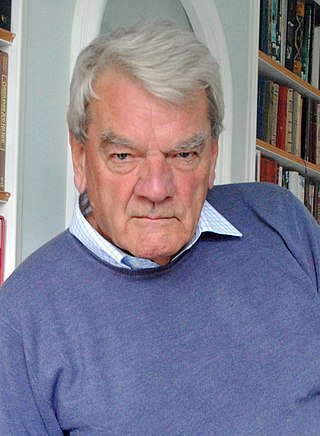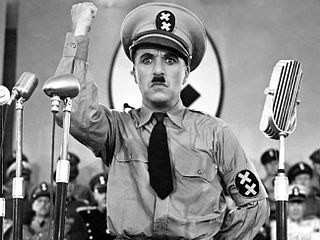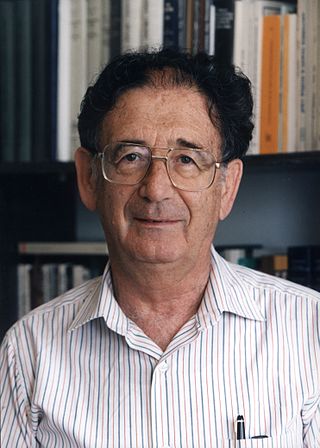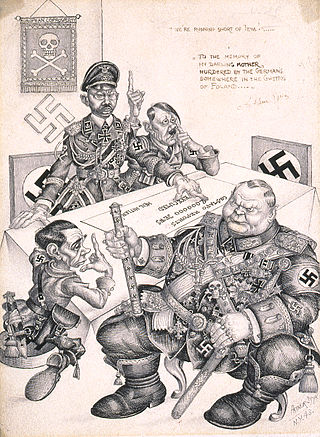
Mein Kampf is a 1925 autobiographical manifesto by Nazi Party leader Adolf Hitler. The work describes the process by which Hitler became antisemitic and outlines his political ideology and future plans for Germany. Volume 1 of Mein Kampf was published in 1925 and Volume 2 in 1926. The book was edited first by Emil Maurice, then by Hitler's deputy Rudolf Hess.

Kristallnacht (German pronunciation:[kʁɪsˈtalnaχt] ) or the Night of Broken Glass, also called the November pogrom(s) (German: Novemberpogrome, pronounced[noˈvɛm.bɐ.poˌɡʁoːmə] ), was a pogrom against Jews carried out by the Nazi Party's Sturmabteilung (SA) paramilitary and Schutzstaffel (SS) paramilitary forces along with some participation from the Hitler Youth and German civilians throughout Nazi Germany on 9–10 November 1938. The German authorities looked on without intervening. The name Kristallnacht (literally 'Crystal Night') comes from the shards of broken glass that littered the streets after the windows of Jewish-owned stores, buildings, and synagogues were smashed. The pretext for the attacks was the assassination of the German diplomat Ernst vom Rath by Herschel Grynszpan, a 17-year-old German-born Polish Jew living in Paris.

David John Cawdell Irving is an English author and Holocaust denier who has written on the military and political history of World War II, with a focus on Nazi Germany. His works include The Destruction of Dresden (1963), Hitler's War (1977), Churchill's War (1987) and Goebbels: Mastermind of the Third Reich (1996). In his works, he argued that Adolf Hitler did not know of the extermination of Jews, or, if he did, he opposed it. Though Irving's negationist claims and views of German war crimes in World War II were never taken seriously by mainstream historians, he was once recognised for his knowledge of Nazi Germany and his ability to unearth new historical documents.

The Jedwabne pogrom was a massacre of Polish Jews in the town of Jedwabne, German-occupied Poland, on 10 July 1941, during World War II and the early stages of the Holocaust. Estimates of the number of victims vary from 300 to 1,600, including women, children, and elderly, many of whom were locked in a barn and burned alive.

Adolf Hitler, dictator of Germany from 1933 to 1945, has been represented in popular culture ever since he became a well-known politician in Germany. His distinctive image was often parodied by his opponents. Parodies became much more prominent outside Germany during his period in power. Since the end of World War II representations of Hitler, both serious and satirical, have continued to be prominent in popular culture, sometimes generating significant controversy. In many periodicals, books, and movies, Hitler and Nazism fulfill the role of archetypal evil. This treatment is not confined to fiction but is widespread amongst nonfiction writers who have discussed him in this vein. Hitler has retained a fascination from other perspectives; among many comparable examples is an exhibition at the German Historical Museum which was widely attended.

Peter Zvi Malkin was a Polish-born Israeli secret agent and member of the Mossad intelligence agency. He was part of the team that captured Adolf Eichmann in Argentina in 1960 and brought him to Israel to stand trial for crimes against humanity.

Yehuda Bauer is a Czech-born Israeli historian and scholar of the Holocaust. He is a professor of Holocaust Studies at the Avraham Harman Institute of Contemporary Jewry at the Hebrew University of Jerusalem.

Udo Kierspe, known professionally as Udo Kier, is a German actor. Known primarily as a character actor, Kier has appeared in more than 220 films in both leading and supporting roles throughout Europe and the Americas. He has collaborated with acclaimed filmmakers such as Lars von Trier, Gus Van Sant, Werner Herzog, Rainer Werner Fassbinder, Walerian Borowczyk, Kleber Mendonça Filho, Dario Argento, Charles Matton, Guy Maddin, Alexander Payne, and Paul Morrissey.

Invincible is a 2001 drama film written and directed by Werner Herzog. The film stars Tim Roth, Jouko Ahola, Anna Gourari, and Max Raabe. The film tells the story of a Jewish strongman in Germany. While basing his story on the real-life figure Zishe Breitbart, Herzog uses the bare facts of Breitbart's life to weave fact and fiction to create an allegory of human strength, knowing oneself with honesty and pride in one's heritage.

The Myth of Hitler's Pope: How Pope Pius XII Rescued Jews from the Nazis is a 2005 book by American historian and Rabbi David G. Dalin. It was published by Regnery Publishing.

Otto Adolf Eichmann was a German-Austrian official of the Nazi Party, an officer of the Schutzstaffel (SS), and one of the major organisers of the Holocaust. He participated in the January 1942 Wannsee Conference, at which the implementation of the genocidal Final Solution to the Jewish Question was planned. Following this, he was tasked by SS-Obergruppenführer Reinhard Heydrich with facilitating and managing the logistics involved in the mass deportation of millions of Jews to Nazi ghettos and Nazi extermination camps across German-occupied Europe. He was captured and detained by the Allies in 1945, but escaped and eventually settled in Argentina. In May 1960, he was tracked down and abducted by Israel's Mossad intelligence agency, and put on trial before the Supreme Court of Israel. The highly publicised Eichmann trial resulted in his conviction in Jerusalem, following which he was executed by hanging in 1962.

Gerhard "Gad" Beck was an Israeli-German educator, author, activist, resistance member, and survivor of the Holocaust.
Patrol 36 was a neo-Nazi skinhead organization in Israel, consisting of 9 members, led by Eli Bonite, alias "Ely the Nazi". The group's members were Russian immigrants that had Jewish roots aged 16 to 21. According to The Daily Telegraph, the men's families were allowed to settle in Israel under the Law of Return.
Critical responses to Holocaust denier David Irving have changed dramatically as Irving, a writer on the subject of World War II and Nazism, changed his own public political views; further, there are doubts as to how far Irving applies the historical method. This article documents some of these critical responses over the course of his writing career.
Events in the year 1938 in Germany.
Events in the year 1944 in Germany.
Leon Prudovsky is an Israeli film director, producer, screenwriter and actor.

There are several major aspects of humor related to the Holocaust: humor of the Jews in Nazi Germany and in Nazi concentration and extermination camps, a specific kind of "gallows humor"; German humor on the subject during the Nazi era; the appropriateness of this kind of off-color humor in modern times; modern anti-Semitic sick humor.

Edward Mosberg was a Polish-American Holocaust survivor, educator, and philanthropist. During the Holocaust, he was held by the Nazis from 14 years of age in Kraków Ghetto, Kraków-Płaszów concentration camp, Auschwitz concentration camp, Mauthausen concentration camp, and a slave labor camp in Linz, Austria, that was liberated by the US Army in 1945. Nearly all of his family were murdered in the Holocaust.














